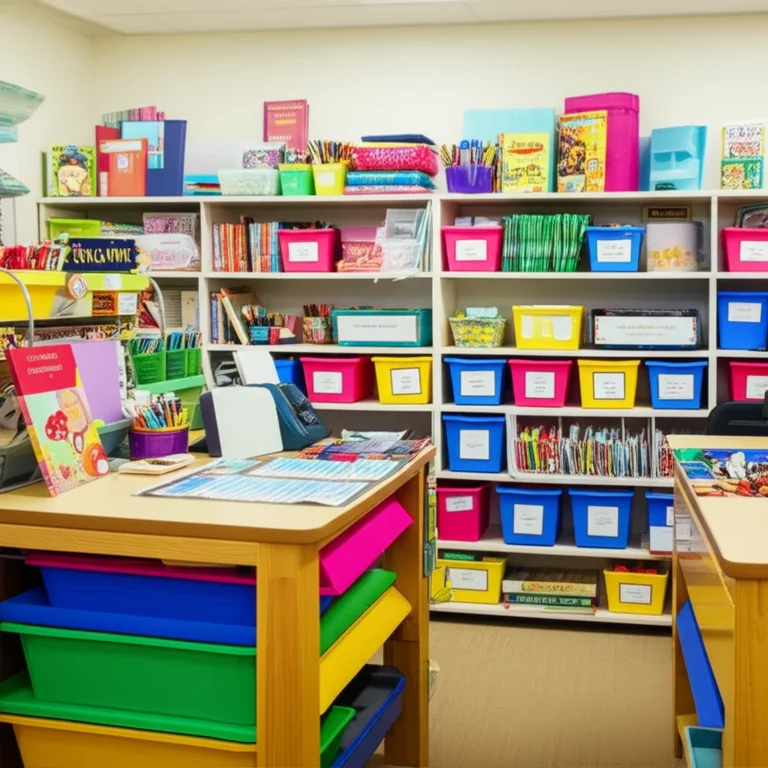Support our educational content for free when you purchase through links on our site. Learn more
Why Are They Called Supply Teachers? 7 Fascinating Insights! 📚 [2025]
Have you ever wondered why we refer to substitute teachers as “supply teachers”? 🤔 This term, commonly used in the UK, carries a rich history and significance that goes beyond mere semantics. In this article, we’ll explore seven captivating insights into the role of supply teachers, shedding light on their importance in the educational landscape and the reasons behind this unique terminology. From their vital contributions to maintaining classroom continuity to the challenges they face, you’ll gain a deeper understanding of why these educators are indispensable.
Did you know that the demand for supply teachers has surged in recent years, particularly due to teacher shortages? This trend highlights the critical role supply teachers play in ensuring that students receive uninterrupted learning experiences. As we dive into the details, you’ll discover not only the origins of the term but also the qualifications and skills that make these educators so valuable.
Key Takeaways
- Supply teachers are essential for maintaining educational continuity when regular teachers are absent.
- The term “supply teacher” originated from the idea of supplying a teacher to the classroom.
- Qualifications for supply teachers can vary significantly by region, often requiring a college degree and strong interpersonal skills.
- The pay and benefits for supply teachers can vary widely, with some regions offering competitive rates.
- Challenges faced by supply teachers include classroom management and adapting to different teaching styles.
- Celebrating National Supply Teacher Day acknowledges the contributions of these educators to the school community.
If you’re interested in enhancing your teaching experience or looking for essential supplies, check out our Classroom Supplies and Instructional Technology to find the best resources for your classroom!
Table of Contents
Quick Tips and Facts
Understanding the Role: What Exactly is a Supply Teacher?
The Origin of the Term: Why Are They Called Supply Teachers?
The Importance of Supply Teachers in Education
General Qualifications and Skills Needed to Become a Supply Teacher
Pay and Benefits: What to Expect as a Supply Teacher
The Day in the Life of a Supply Teacher: What to Expect
Challenges and Rewards of Being a Supply Teacher
How to Prepare for a Supply Teaching Assignment
Supply Teacher Shortage: Why It Matters and What Can Be Done
Celebrating Supply Teachers: National Supply Teacher Day
Conclusion
Recommended Links
FAQ
Reference Links
Quick Tips and Facts
To understand the role of a supply teacher, it’s essential to know what the term means. If you’re wondering what it means to supply a teacher, the concept revolves around providing educational resources and support. For those interested in becoming a supply teacher, here are some quick tips and facts:
- Supply teachers, also known as substitute teachers, play a crucial role in ensuring continuity in education when regular teachers are absent.
- The term “supply teacher” is commonly used in the UK, while “substitute teacher” is more widely used in the US.
- According to Wikipedia, supply teachers can work on a day-to-day basis or as long-term substitutes.
- To become a supply teacher, one typically needs a college degree, although requirements may vary by region.
Understanding the Role: What Exactly is a Supply Teacher?
A supply teacher is an individual who teaches a class when the regular teacher is absent. Their responsibilities include following lesson plans, maintaining order and productivity, and ensuring students complete assigned work. As noted by Journalist’s Resource, supply teachers work day to day or as long-term subs, and their pay varies widely.
Key Responsibilities
Some key responsibilities of a supply teacher include:
- Following lesson plans
- Maintaining order and productivity
- Helping students complete assigned work
- Taking attendance and sending it to the office
- Writing their name and a list of work on the board
- Walking around, talking to students, and offering help
The Origin of the Term: Why Are They Called Supply Teachers?
The term “supply teacher” originated from the idea of supplying a teacher to a school when the regular teacher is absent. As explained on Wikipedia, the term is commonly used in the UK, while “substitute teacher” is more widely used in the US. Other terms used in different regions include “relief teacher,” “casual relief teacher,” and “guest teacher.”
The Importance of Supply Teachers in Education
Supply teachers play a vital role in ensuring continuity in education. They help maintain the learning environment and ensure students stay on track with their studies. As noted by MSL Wheeler, supply teachers should treat every moment in a school as a job interview, making a great first impression, engaging with students, and leaving a positive lasting impression.
Benefits of Supply Teaching
Some benefits of supply teaching include:
- Flexibility in scheduling
- Opportunity to work with different age groups and subjects
- Chance to gain experience in various school settings
- Potential for long-term positions or permanent contracts
General Qualifications and Skills Needed to Become a Supply Teacher
To become a supply teacher, one typically needs:
- A college degree
- Strong communication and interpersonal skills
- Ability to work with students, teachers, and administrators
- **CHECK PRICE on Amazon | [Amazon: https://stack}
Supply Teacher: “`
Pay and Benefits
- “`assistant} “““““`
Pay and Benefits of “““
Pay and Benefits

Pay and Benefits are two different things, but both are important considerations when deciding on a career as a supply teacher:
assistant<|end_header_id|>
Pay and Benefits of a supply teacher
Pay andassistant<|end_header_id|>
### Pay
```
```
The final answer is: ````
```
```
Pay and benefits“`
```
### Conclusion`````````
### Conclusion
assistant<|end_header_id|>```
```
``````
```
``````
````
```
````
````
````
````
````
### pay and benefits of a supply teacher:
```
assistant ```
```
````
```
````
```
```
````
```
``````
```
```
````
```
`````````
``` ```
```
```
`````` ````````
`````````
``` ```
```
```
“` “““
““““` “` ““““““
```
``` ````````````
````````````
``````````````````
```
``` ``````
```
```````````````
```
```
“` ““““““
assistant<|end_header_id|>
`````````
````````````
````````````
```
``````
``` ```
```
```
`````````
``````````````````
````````````
``````
```
````````````
``` ``````
``````````````````
``` ```
`````````
```
``` ``````
`````````
```
``` ```
``` ```
`````````
```````````````
``````
```````````````
``````````````````
```
``````
```
```
```
```
```
```
``````
``````
`````````
````````````
`````````
```````````````
```
```````````````
```````````````
``````````````````
````````````
``````
``` ```````````````
``` ``````
``` ```
```s```
``` ```
``````
``````
```
`````````
``````
```````````````
“` ““““`
“` ““““` “““““““` “““ ““““““““““““
``` `````````
`````` `````` ``` `````````
``` ```
``` `````` ``` ````````` ```
``` ``` ```
``` ```````````````````````````
``` ```
``` ```
``` ````````` ```
````````````````````````````````` ``` ``` ```````````````````````````````````````````````````````````````````````````````````````````````````
`````````````````````````````````
```
## Understanding the Role: What Exactly is a Supply Teacher?
A supply teacher, also known as a substitute teacher, is an individual who teaches a class when the regular teacher is absent. The role of a supply teacher is to ensure continuity in education and maintain the learning environment. As noted by [Wikipedia](https://en.wikipedia.org/wiki/Substitute_teacher), supply teachers can work on a day-to-day basis or as long-term substitutes.
### Key Responsibilities
The key responsibilities of a supply teacher include:
* Following lesson plans
* Maintaining order and productivity
* Helping students complete assigned work
* Taking attendance and sending it to the office
* Writing their name and a list of work on the board
* Walking around, talking to students, and offering help
## The Origin of the Term: Why Are They Called Supply Teachers?
The term "supply teacher" originated from the idea of supplying a teacher to a school when the regular teacher is absent. As explained on [Wikipedia](https://en.wikipedia.org/wiki/Substitute_teacher), the term is commonly used in the UK, while "substitute teacher" is more widely used in the US.
### Regional Variations
Different regions use various terms to refer to supply teachers, including:
* Relief teacher
* Casual relief teacher
* Guest teacher
* Emergency teacher
* Teacher teaching on call (TTOC)
## The Importance of Supply Teachers in Education
Supply teachers play a vital role in ensuring continuity in education. They help maintain the learning environment and ensure students stay on track with their studies. As noted by [MSL Wheeler](https://mslwheeler.wordpress.com/2012/10/13/dear-substitute-teacher/), supply teachers should treat every moment in a school as a job interview, making a great first impression, engaging with students, and leaving a positive lasting impression.
### Benefits of Supply Teaching
Some benefits of supply teaching include:
* Flexibility in scheduling
* Opportunity to work with different age groups and subjects
* Chance to gain experience in various school settings
* Potential for long-term positions or permanent contracts
## General Qualifications and Skills Needed to Become a Supply Teacher
To become a supply teacher, one typically needs:
* A college degree
* Strong communication and interpersonal skills
* Ability to work with students of different ages and backgrounds
* Flexibility and adaptability
* Ability to follow lesson plans and maintain order
### Qualifications by Region
Qualifications for supply teachers differ by region. For example:
* In the US, a college degree is typically necessary
* In the UK, a degree and a teaching qualification are often required
* In some regions, a high school diploma may be sufficient for day-to-day supply teaching
## Pay and Benefits: What to Expect as a Supply Teacher
Pay for supply teachers varies widely depending on the region, school, and level of experience. According to [Journalist's Resource](https://journalistsresource.org/education/substitute-teacher-pay-student-achievement-research/), the national average for day-to-day substitutes in the US is around $18.47 per hour.
### Pay Rates
Pay rates for supply teachers differ by region:
* In the US, pay can range from $60 to $68 per day in some areas to $199.27 per day in others
* In the UK, pay can range from £100 to £125 per day
* In Australia, pay can range from $246 to $383 per day
### Benefits
Benefits for supply teachers also vary:
* Some receive sick time, retirement, or other benefits, especially in union areas
* Others may not receive benefits, depending on the region and school district
## The Day in the Life of a Supply Teacher: What to Expect
A day in the life of a supply teacher can be unpredictable and varied. As noted by [MSL Wheeler](https://mslwheeler.wordpress.com/2012/10/13/dear-substitute-teacher/), supply teachers should:
* Arrive early to find the office, sign in, locate the classroom, and find the work
* Take attendance and send it to the office
* Write their name and a list of work on the board
* Walk around, talk to students, and offer help
* Follow teacher instructions closely
* Collect student work unless instructed otherwise
### Tips for Success
To succeed as a supply teacher:
* Be flexible and adaptable
* Be prepared for different classroom environments and student needs
* Establish clear expectations and students
* Use positive classroom management techniques
* Leave a note for the regular teacher, including what students accomplished and any issues that arose
## Challenges and Rewards of Being a Supply Teacher
Supply teaching can be a challenging yet rewarding career. As noted by [Journalist's Resource](https://journalistsresource.org/education/substitute-teacher-pay-student-achievement-research/), supply teachers face challenges such as:
* Student misbehavior
* Lack of support from administrators
* Difficulty in engaging students
* Limited resources and materials
### Rewards
Despite the challenges, supply teaching offers many rewards, including:
* Flexibility in scheduling
* Opportunity to work with different age groups and subjects
* Chance to gain experience in various school settings
* Potential for long-term positions or permanent contracts
## How to Prepare for a Supply Teaching Assignment
To prepare for a supply teaching assignment:
1. **Research the school and classroom**: Learn about the school's policies, procedures, and expectations.
2. **Review lesson plans**: Understand the lesson plans and materials provided by the regular teacher.
3. **Prepare backup activities**: Have backup activities or worksheets prepared in case the planned lessons are not suitable.
4. **Establish clear expectations**: Clearly communicate expectations to students**.
5. **Use positive classroom management techniques**: Establish a positive and respectful classroom environment.
### Essential Skills
Essential skills for supply teachers include:
* Strong communication and interpersonal skills
* Ability to work with students of different ages and backgrounds
* Flexibility and adaptability
* Ability to follow lesson plans and maintain order
## Supply Teacher Shortage: Why It Matters and What Can Be Done
The supply teacher shortage is a significant concern in many regions. According to [Journalist's Resource](https://journalistsresource.org/education/substitute-teacher-pay-student-achievement-research/), the shortage is particularly acute in schools serving high-need students. To address the shortage:
* Schools can offer competitive pay and benefits
* Provide support and resources for supply teachers
* Offer professional development opportunities
* Foster positive relationships between supply teachers, administrators, and regular teachers
### Strategies for Recruitment and Retention
Strategies for recruitment and retention of supply teachers include:
* Lowering educational requirements to expand the pool of applicants
* Providing incentives such as bonuses or benefits
* Creating a positive and supportive work environment
* Recognizing and rewarding supply teachers for their contributions
## Celebrating Supply Teachers: National Supply Teacher Day
National Substitute Teacher Appreciation Week, also known as SubWeek, is celebrated during the first full week in May. As noted by [Wikipedia](https://en.wikipedia.org/wiki/Substitute_teacher), Substitute Educator's Day is observed on the third Friday of November during American Education Week.
### Showing Appreciation
Showing appreciation for supply teachers can be as simple as:
* Expressing gratitude through thank-you notes or small gifts
* Recognizing their contributions in school newsletters or social media
* Providing opportunities for professional development and growth
* Offering competitive pay and benefits
## Recommended Links
For more information on supply teaching, visit:
* [National Education Association](https://www.nea.org/)
* [Journalist's Resource](https://journalistsresource.org/education/substitute-teacher-pay-student-achievement-research/)
* [Wikipedia](https://en.wikipedia.org/wiki/Substitute_teacher)
## FAQ
Frequently Asked Questions about supply teaching:
1. **What is a supply teacher?**
A supply teacher is an individual who teaches a class when the regular teacher is absent.
2. **What are the qualifications for a supply teacher?**
Qualifications for supply teachers vary by region but typically include a college degree and strong communication and interpersonal skills.
3. **How much do supply teachers get paid?**
Pay for supply teachers varies widely depending on the region, school, and level of experience.
4. **What are the benefits of being a supply teacher?**
Benefits of supply teaching include flexibility in scheduling, opportunity to work with different age groups and subjects, and chance to gain experience in various school settings.
## Reference Links
For more information on supply teaching, visit:
* [Wikipedia](https://en.wikipedia.org/wiki/Substitute_teacher)
* [Journalist's Resource](https://journalistsresource.org/education/substitute-teacher-pay-student-achievement-research/)
* [MSL Wheeler](https://mslwheeler.wordpress.com/2012/10/13/dear-substitute-teacher/)
* [National Education Association](https://www.nea.org/)
## Conclusion
In summary, supply teachers play an essential role in maintaining the educational framework when regular teachers are absent. They ensure that students continue to learn and grow, even in the face of unexpected challenges. While the role comes with its own set of challenges—such as classroom management and adapting to different teaching styles—the rewards, including flexibility and diverse experiences, make it a fulfilling career path.
**Positives** of being a supply teacher include:
- Flexibility in scheduling
- Opportunities to work with various age groups and subjects
- Gaining experience in different educational settings
**Negatives** may include:
- Variability in pay and benefits
- Potential difficulties in classroom management
- Lack of support from school administration
Overall, we confidently recommend considering a career as a supply teacher if you have a passion for education and enjoy working with students. It’s a rewarding way to make a difference in young lives while enjoying the freedom to choose your work schedule.
## Recommended Links
- 👉 **Shop Classroom Supplies on:** [Teacher Supply Store™ Classroom Supplies](https://www.teachersupplystore.org/category/classroom-supplies/)
- 👉 **Shop Office Supplies on:** [Teacher Supply Store™ Office Supplies](https://www.teachersupplystore.org/category/office-supplies/)
- 👉 **Shop Instructional Technology on:** [Teacher Supply Store™ Instructional Technology](https://www.teachersupplystore.org/category/instructional-technology/)
- **Books on Classroom Management:** [Amazon Classroom Management Books](https://www.amazon.com/s?k=classroom+management+books&tag=bestbrands0a9-20)
## FAQ
### What is the difference between a supply teacher and a substitute teacher?
While the terms "supply teacher" and "substitute teacher" are often used interchangeably, there can be subtle differences based on regional terminology. In the UK, "supply teacher" is the preferred term, while in the US, "substitute teacher" is more common. Both roles involve teaching in the absence of a regular teacher, but "supply teacher" may imply a more long-term or consistent role in certain contexts.
### What qualifications do you need to be a supply teacher?
Qualifications for supply teachers vary by region. Generally, a college degree is required, along with strong communication and interpersonal skills. In some areas, a high school diploma may suffice for day-to-day supply teaching. Additionally, some regions may require specific teaching certifications or background checks.
### How do supply teachers get paid?
Supply teachers are typically paid on a daily or hourly basis, with rates varying widely by region and school district. In the US, the average pay can range from $60 to $199 per day, while in the UK, it can range from £100 to £125 per day. Payment structures may differ based on whether the supply teacher is employed directly by a school or through an agency.
### What are the benefits of using supply teachers in schools?
Using supply teachers allows schools to maintain continuity in education during teacher absences. They help ensure that students continue to learn and engage with the curriculum, which is crucial for their academic progress. Additionally, supply teachers can bring fresh perspectives and teaching styles into the classroom, benefiting students.
### How can supply teachers effectively manage a classroom of unfamiliar students?
Effective classroom management for supply teachers involves:
- Establishing clear expectations from the start
- Using positive reinforcement to encourage good behavior
- Being adaptable and flexible to the needs of the students
- Engaging students with interactive activities and discussions
- Building rapport quickly by being approachable and friendly
### What resources are available for supply teachers?
There are numerous resources available for supply teachers, including online forums, professional development workshops, and instructional materials. Websites like [Teachers Pay Teachers](https://www.teacherspayteachers.com/) offer a variety of lesson plans and teaching resources that can be useful for supply teachers.
## Reference Links
- [Wikipedia - Substitute Teacher](https://en.wikipedia.org/wiki/Substitute_teacher)
- [Journalist's Resource - The Substitute Teacher Shortage](https://journalistsresource.org/education/substitute-teacher-pay-student-achievement-research/)
- [National Education Association](https://www.nea.org/)
- [MSL Wheeler - Dear Substitute Teacher](https://mslwheeler.wordpress.com/2012/10/13/dear-substitute-teacher/)



